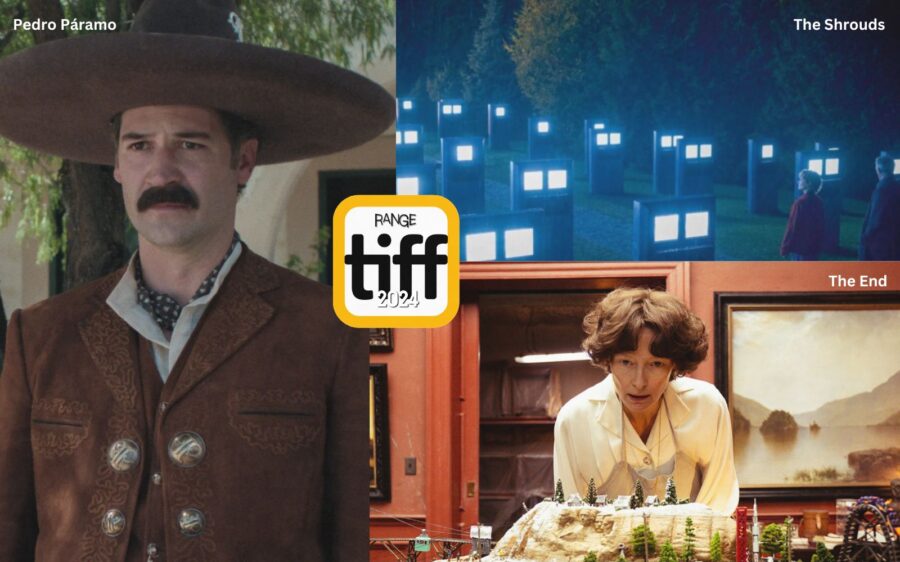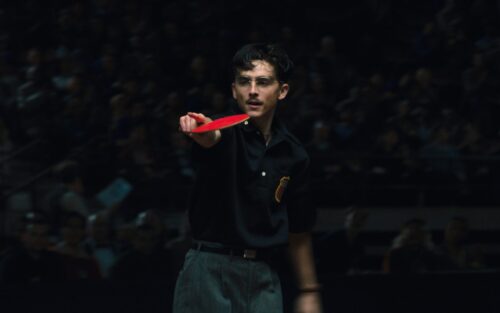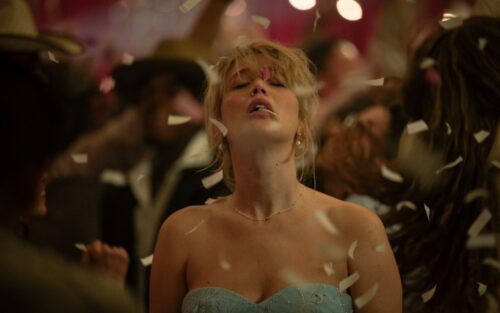
RANGE Magazine’s TIFF ‘24 Picks of the Fest
International legends, homegrown heroes, and masters of the craft all converge on Toronto for 11 days of pandemonium.
by Prabhjot Bains and Maggie McPhee
- Published on
This year marks the unofficial return of the Toronto International Film Festival (TIFF) in all its glory, after the pandemic and last year’s SAG-AFTRA strike. And the 49th edition of TIFF is taking full advantage of that momentum, with one of the most exciting line-ups in recent memory. We’ve sieved through all that cinematic gold and pared it down to 10 must-sees.
Dahomey (Mati Diop)
Mati Diop’s 2019 debut film Atlantics won the Cannes Grand Prix, making history as the first film directed by a black woman to premiere at the French festival. Accolades aside, it’s a stunning, layered, and poetic ghost story that allegorizes the refugee crisis and class struggle as it bears on the people of Dakar. Her latest, Dahomey, promises the same subtle, emotionally-centred political critique, this time taking on colonialism, slavery, and looting. The Berliniale’s Golden Bear winner infuses Diop’s trademark docu-experimentalism as she follows the restitution of 26 royal treasures from France to Benin, set to a score by Dean Blunt and Wally Badarou.
The Brutalist (Brady Corbet)
Not since 1961’s One Eyed Jacks has an American film been primarily shot with the VistaVision format. In employing a precursor to modern-day IMAX film stock, Director Brady Corbet looks to catapult us back to the past with sheer scope and vision in his latest outing, The Brutalist. Presented on 70MM at this year’s festival, Corbet’s mammoth, 215-minute American epic aims to envelop the senses with its decades-long immigrant tale.
The Brutalist follows László Toth (Adrien Brody) a Jewish Hungarian architect who settles in Philadelphia after the end of the Second World War with little funds while eagerly awaiting the arrival of his wife, Erzsébet (Felicity Jones). After bumping into the wealthy Lee Van Buren (Guy Pearce), he wins a dream construction contract that soon forces him to sacrifice everything to realize. Corbet’s follow-up to 2018’s Vox Lux, feels primed to be a grand and beautifully stark meditation on time, obsession, and the American Dream. It might just be the great modern American epic.
The Mother and the Bear (Johnny Ma)

Canadian-Chinese director Johnny Ma’s economy of style and sureness of intent earned his debut film Old Stone (‘16) TIFF’s Best Canadian First Feature Film award. His follow up, 2019’s To Live, To Sing, took up a similarly serious stance on modern China. But his third, The Mother and the Bear, pivots in both style and substance. For starters, it takes place in Winnipeg. Secondly, it tells the story of an anxious Korean mother taking over her comatose daughter’s life with whimsy and flair. Part of the anticipation here is to see how Ma, a master of tension and subtlety, translates his talents for a different end.
The Shrouds (David Cronenberg)
It’s only fitting that David Cronenberg returns to his hometown film fest with his most autobiographical and grief-stricken work yet. With The Shrouds, the body horror maestro points the lens inwards, drawing on his wife’s passing in 2017 to deepen a treatise on loss, decay, and human frailty. Cronenberg’s decision to costume star Vincent Cassel in his image further piques a morbid interest in this chilling sci-fi vision.
Cassel stars as Karsh, a grieving entrepreneur who invents controversial technology that allows loved ones to watch and monitor the decomposition of lost family members. While far from charming, it offers a physical link where none other exists. After his wife’s plot is desecrated, Karsh careens towards tumult as he searches for the perpetrators. Also starring Diane Kruger, Guy Pearce, and Sandrine Holt, The Shrouds marks a bold cross-section between tragedy and body horror. In Cronenberg’s hands, it may well be the type of later-career masterwork that only few filmmakers can conjure.
Anora (Sean Baker)
Beloved American indie filmmaker Sean Baker took home the highest of all cinematic honours this summer, the Cannes’ Palme d’Or, for his latest feature Anora. Baker broke onto the international stage with Tangerine (2015), a film short entirely on an iPhone. His unique gift as a director lies in uplifting unlikely actors, whether the breakout seven-year-old starlet Brooklynn Prince in The Florida Project (‘17) or Simon Rex AKA Dirt Nasty in Red Rocket (‘21). Mikey Madison takes the mantle as the eponymous Anora, a Brooklyn sex worker who becomes entangled with the son of a Russian oligarch.
The Room Next Door (Pedro Almodóvar)
Perhaps no one captures the form and feel of Women’s private, internal lives better than Pedro Almodóvar. Though he departs the Iberian Peninsula with The Room Next Door—his first English language feature— he retains the lush palette and complex intimacy that render his work so visionary.
This adaptation of Sigrid Nunez’s “What Are You Going Through” follows Ingrid (Julianne Moore), a best-selling author who rekindles an old friendship with journalist Martha (Tilda Swinton). Together the two bond over secrets, stories, and, most of all, mortality. With this latest effort, Almodovar promises another gorgeously photographed experience, full of beautifully flawed characters and superb leading performances, all set to the tune of another stirring Alberto Iglesias score.
Caught by the Tides (Jia Zhang-Ke)
Legendary auteur Jia Zhang-Ke has made a name for himself as one of China’s leading counter-culture filmmakers, releasing his earliest works underground without state approval or financing. His oeuvre, including Still Life (‘06), A Touch of Sin (‘13), and Ash is Purest White (‘18), has taken the pulse of recent history, addressing globalisation, modernisation, and hyper-capitalism in a cinematic language that registers with viewers on a cellular level. Caught by the Tides looks back on this history, including Zhang-Ke’s personal history as a filmmaker. It might just be a magnum opus of sorts.
Pedro Páramo (Rodrigo Prieto)
Rodrigo Prieto, the legendary cinematographer behind Killers of the Flower Moon (‘23), The Irishman (‘19), and Amores Perros (‘00) finally plops down on the director’s chair for his feature debut, Pedro Páramo. Adapted from Juan Rulfo’s canonical 1955 novel, the film follows Juan Preciado (Tenoch Huerta) who travels to a seemingly abandoned town in search of his estranged and wealthy father, the titular Pedro Páramo (Manuel García-Rulfo). As Juan’s search continues, the ghost town comes to life, with the voices of the dead populating the street. Past and present become one in this beguiling ghost story of lineage and corruption, offering glimpses into the Mexican Revolution and the 1930s. With Prieto operating as his own cinematographer, his debut is set to offer an epic vision of Mexico’s fraught and colourful history.
Universal Language (Matthew Rankin)
Winnipeg native Matthew Rankin takes cues from the city’s cinematic heavyweight Guy Maddin with this gentle and charming comedy set in a Canada where Persian and French are the two official languages. Universal Language lightens the dark comedy of Rankin’s award-winning debut, The Twentieth Century (‘19) while staying close to the cloth of quirked up Canadiana. This portrait of a fictional place won Cannes’ inaugural Director Fortnight’s audience award and has been selected as Canada’s Oscar entry for 2025.
The End (Joshua Oppenheimer)

After making two of the greatest (and most damning) documentaries of the last decade, The Act of Killing (‘12) and The Look of Silence (‘14), Joshua Oppenheimer returns with The End, his fiction feature debut. The film centres on the supposed last remaining family on earth, who reside in a lavish bunker after human society crumbles under environmental catastrophe. While the film — which stars Tilda Swinton, George MacKay, Michael Shannon, and Moses Ingram — tackles the same dangers of collective denial and inaction, it does so in a manner very different than other apocalyptic stories— in the form of a musical. The End will surely be one of the most unsettling, reflective, and weird experiences at this year’s festival.
The Toronto International Film Festival runs September 5 through 15. Find tickets and more info at tiff.net
By Prabhjot Bains
Glen Powell fights his way through a blunt but lovingly pulpy satire.
By Prabhjot Bains
Jennifer Lawrence goes ballistic and animalistic in Lynne Ramsay’s fever-dream character study.
















